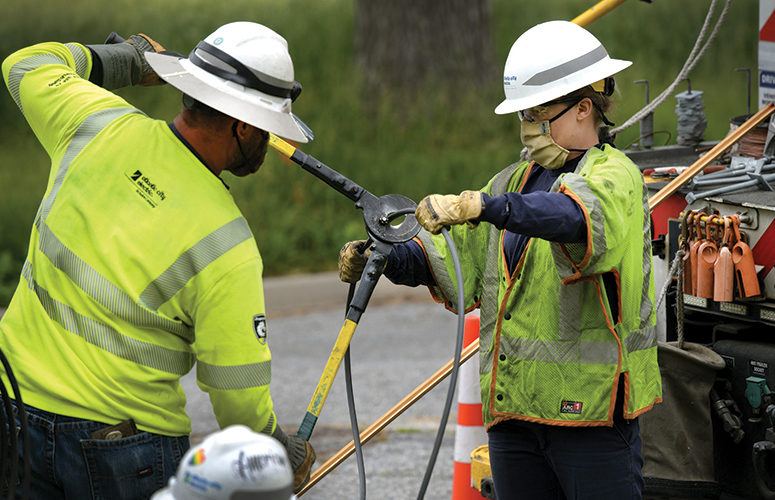
Energy Savings for Residential and Small Business Customers
Many of the state’s energy providers have seen increased customer usage since the start of the pandemic, and are offering programs (and incentives) to help customers save money.
By Jennifer Lesser, Contributing Writer On Jan 13, 2021The COVID-19 pandemic has drastically changed the lives of many New Jerseyans. According to the state’s energy providers, energy usage has also changed amongst both residential and small business customers, as many companies have found ways to shift their operations online and encourage employees to work remotely. Fortunately, as many residents and small business owners are relying on their energy providers to stay connected, there are countless money-saving measures becoming available, from energy-efficiency incentives to fixed-price plans.
According to Bruce Stewart, president of Direct Energy Home, there has been an increase in residential customers’ energy usage since March due to many companies closing their physical locations and encouraging employees to work from home. “This means that it’s as important as ever that each household review and really understand their energy plans,” he says. “In New Jersey, residents can choose their electricity and natural gas provider, which means they can shop for the best plan for their home.”
Direct Energy offers fixed price energy plans that provide price stability for up to three years, as well as a plan that supports green energy. “Beyond controlling how much you pay for a kilowatt hour or therm, the easiest way to lower your energy bill is to control your usage with energy-efficiency tips. For example, by changing your lighting to LED bulbs, you can use up to 7% less energy than traditional bulbs,” Stewart says.
Meanwhile, the company saw a decrease in energy consumption amongst its commercial and industrial clients, as most large office buildings and many other commercial buildings – such as malls and factories – were largely empty in the months following the statewide shutdown in March. According to Bill Olderman, account executive for Titan Energy, another byproduct of the initial shutdown in New Jersey was that many facility upgrades and new construction projects were paused, which halted the allocation of state energy efficiency and renewable incentives. “This resulted in an accumulation of funds as utilities fell behind energy-efficiency mandates,” he explains. But that has actually turned out to be a positive thing for residential and small business customers. “As the state has re-opened, the utility and state incentives have been increasing and becoming more attractive: If lighting upgrades, energy efficiency, solar or co-generation projects didn’t make economic sense a year ago, these projects are definitely worth revisiting as more incentives are becoming available,” Olderman asserts.
There are some energy providers, however, that are reporting only minimal changes in usage across the board. According to Frank Tedesco, spokesperson for Atlantic City Electric, the shifts the company has seen in both residential and small business customers aren’t significant. Instead, they’re comparable to what they might expect over the course of a weekend (when most people are typically out of office buildings).
“The impact of the COVID-19 pandemic on New Jersey’s energy market has been varied, as there have been shifts in ratepayer’s energy use, an increased risk for suppliers, and new opportunities for utility rebates and incentives,” Olderman adds. These variations have, of course, impacted suppliers of natural gas and electricity, who generally require more certainty when investing in the production of more or less power. “Small and medium energy users have been subject to a higher risk of business failure, so suppliers have built this risk into commodity pricing,” he says.
Olderman advises that small businesses navigate this increase in pricing by locking in low rates for multiple year contracts as suppliers may ultimately try to recoup any losses resulting from the global economic downturn. Atlantic City Electric has proposed a suite of energy-efficiency programs that will provide both residential and business customers with more tools and resources to take control of their energy usage and save money. Upon approval by the New Jersey Board of Public Utilities, the company expects to begin rolling out some of these initial programs in July 2021.
Meanwhile, large energy users, particularly industrial organizations, have been benefiting from lower rates for power. Olderman explains that, depending on the industry, large commercial and industrial ratepayer’s energy use was not significantly affected by the pandemic, so the risk has actually been lower for suppliers. Looking ahead into the second and third quarter of 2021, clients of all sizes are predicting that rates will begin to climb, so they are actively locking in energy contracts for three to four years in advance.
Energy providers are saying the jury’s still out on what the energy market will look like in the new year (and beyond). In 2021, it’s likely that residential usage will continue to slightly increase (as it did in 2020), as many New Jerseyans are using natural gas to heat their homes throughout the day during the winter. “Now that we all have a taste of what it’s like to live and work from home, it’s a good time to really lean into some energy-efficiency upgrades, like installing new windows or purchasing Energy STAR rated appliances,” Stewart advises. “If you’re not able to invest in upgrades, you can do simple things around the house such as adding new weather strips to doors, getting your furnace tuned up, and closing your garage door to trap heat.”
Tedesco notes that Atlantic City Electric is also encouraging customers to continue to monitor their energy usage and take actions to reduce energy consumption, such as using a programmable thermostat, turning the lights off when leaving a room, and caulking and weather-stripping windows and doors. As an alternate option, the company is also offering a new no-cost program known as the Virtual Quick Home Energy Check-up. “Due to the pandemic, we suspended the in-home version of this program and created a virtual option that allows customers to work with an energy analyst via phone or video chat. Afterwards, customers get a no-cost kit in the mail that includes energy-saving products that are easy to install, like ENERGY STAR certified LED bulbs, faucet aerators, and a smart power strip,” he explains.
As far as longer-term trends, Gov. Phil Murphy’s Energy Master Plan will also have a continued impact on energy usage for residential and small business customers. Stewart notes that the plan may help preserve small business owners’ and homeowners’ right to choose their energy provider and will even help suppliers offer better products. “One of the main pillars of the Energy Master Plan involves the deployment of smart meters and advanced metering infrastructure, which will allow customers to share their usage data with providers,” Stewart explains. “We, as an energy provider, can then better pinpoint usage and create products and services around our customer’s natural usage patterns to help reduce and manage costs, such as offer time-of-use products like free nights and weekends.”
Atlantic City Electric is also committed to connecting both residential and business customers to a variety of clean, reliable and affordable energy services and choices, including clean electric transportation, battery storage, smart city technologies, and enhanced energy from solar and wind. Residential and small business customers can benefit from its proposed energy efficiency programs, which are expected to save customers more than $550 million. A proposed Smart Energy Network and other programs are currently under review.
“As we advance towards a clean energy future, customers will have more choices and services, greater ability to reduce their carbon footprint, better air quality, increased savings through energy efficiency programs, faster storm response and better reliability with smarter energy infrastructure, and a stronger economy bolstered by clean energy jobs,” Tedesco concludes.
Building Dream Homes You’ll Want to Stay In – Pandemic or Not
Contractor Victor Zucchi & Son Stresses: ‘There’s no place like home!’
According to Christopher Zucchi, who represents the fourth-generation of the Bogota-based building contractor Victor Zucchi & Son, the pandemic has caused homeowners to view their home environment differently.
“People are spending most of their time at home now – and noticing things,” Zucchi explains. “Maybe the kitchen doesn’t work for them anymore or there is simply not enough space for privacy or activities. So, our firm is problem solving to create more comfortable spaces that meet clients’ needs: that transforms their residences into the dream homes they’ve always wanted.”
Eighty-five years of accumulated artistry, craftsmanship and skill – all with its roots in Italy – are the tools Victor Zucchi & Son uses to create one-of-a-kind spaces and designs for each home.
As people decide to expand their homes or move during the pandemic, the firm is busy throughout the area not only building dream homes and additions, but also doing the interior design and decorating.
The contractor takes COVID -19 precautions for staff and clients very seriously, exceeding recommended public health guidelines. That lines up with the building contractor’s reputation in exceeding expectations. “We attack every single project, large or small, on the owner’s behalf, as if we were the construction managers,” Zucchi says.
It is the joy of the final reveal, when the project is complete, that the Zucchi family lives for and looks forward to.
“We like to create a finished project with such a ‘Wow’ factor that clients can’t miss it – even if they’ve seen the entire building process,” Zucchi says. “I love seeing the look on people’s faces and knowing we knocked their socks off.”
To access more business news, visit NJB News Now.
Related Articles:





